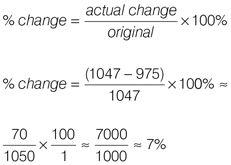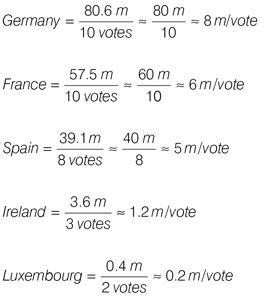How to Pass Numerical Reasoning (45 page)
Read How to Pass Numerical Reasoning Online
Authors: Heidi Smith

In order to find the number of non-approved claims, subtract the number of approved claims from the total number of claims.
Year | Total | Approved | Non-approved |
1993 | 966 | 720 | 246 |
1994 | 1047 | 813 | 234 |
1995 | 1013 | 726 | 287 |
1996 | 930 | 310 | 620 |
1997 | 975 | 428 | 547 |
Now look for a ratio of non-approved claims to approved claims in the ratio of 2 : 1. There are only two years in which the number of non-approved claims exceeds approved claims, 1996 and 1997: 1996 ratio = 620 : 310
1997 ratio = 547 : 428
By reducing the ratios to the simplest form you will see that the 1996 ratio = 2 : 1.
Q4
b) 7% decrease
1997 total number of claims = 975; 1994 total number of claims = 1047. The number of claims in 1997 represents a decrease on the 1994 total, so eliminate all the answers that represent an increase. You are left with answer choices a), b) and d). Now work out the actual percentage decrease. Recall the formula for percentage change.

Section 2 Goe-Ezy-Bizz flight charges
Q1
d) £40
Single fare Edinburgh to Barcelona = £20
Return fare = 20 × 140% = | £28 |
Outbound insurance | £1.60 |
Inbound insurance | £1.60 |
Outbound tax | £5 |
Inbound tax | £3.23 |
Total = £39.43. The question asks for the approximate cost so choose the closest answer.
Q2
c) £6.60
Liverpool | Luton | |
Fare | £20 | £20 |
O/B insurance | £1.60 | £3.20 |
O/B tax | £0 | £5 |
Total | £21.60 | £28.20 |
The difference in price = £28.20 – £21.60 = £6.60
Q3
b) Edinburgh
In Q1 you worked out the price of a return flight from Edinburgh (£28). As all the flights are discounted by the same percentage you can read directly from the table the price of the cheapest return fare without completing the calculation.
Q4
b) 31 euros
The price of a single fare from Liverpool to Barcelona = £20. To convert £20 to euros, multiply by the exchange rate. £20 × 1.55 euros = 31 euros.
Section 3 Council services employment
Q1
a) 15
In Education 42% were hired. In Health 32% were hired. The difference = 10%. 10% of 150 = 15.
Q2
b) 17
The total number hired into Local Services is:

The question tells you that one-third of the total (39) hired into Local Services were school-leavers. Therefore (
1
⁄
3
× 39 = 13) school leavers were hired into Local Services.
Figure 6.1
tells you that 20% of the new employees were school leavers, and 20% × 150 = 30. If 13 were hired into Local Services, then (30 – 13) = the number hired into Education and Health = 17.
Q3
c) 18
The actual number of sixth form leavers employed in Local Services = 32% × 150.

You are given a part : part : part ratio and the sum of the parts in a part : part ratio = the whole.
1 : 3 : 4 = 1 + 3 + 4 = 8. The proportion employed in local services is 3 parts of the whole, or
3
⁄
8
.
3
⁄
8
× the total number of sixth form leavers =

Q4
b) 25%
The actual number of further education candidates employed = 16% × total number employed:

You may recognize immediately that 6 is ¼ of 24, or 25%. If not, use the percentage change formula and plug in the numbers.


Section 4 European institutions
Q1
e) Luxembourg
The question is asking ‘how many people does 1 vote represent in the Council of Ministers?’ You are really working out a ‘part to part’ ratio.

In Luxembourg, 1 vote represents approximately 0.2 m people whereas in Germany 1 vote represents approximately 8 m people, so Luxembourg is best represented.
Q2
a) Germany
The question asks you which country is least represented by seats in the Parliament relative to its population size. Set up a ‘part to part’ ratio. This will tell you how many of the population are represented by each seat. Round the numbers up to ease the calculation.
Seats | Population | Approximate ratio | ||
Germany | 99 ( ≈ 100) | 80.6 m ( ≈ 80 m) | ≈ | 1 : 800,000 |
France | 87 ( ≈ 90) | 57.5 m ( ≈ 60 m) | ≈ | 1 : 700,000 |
Spain | 64 ( ≈ 60) | 39.1 m ( ≈ 40 m) | ≈ | 1 : 600,000 |
Ireland | 15 ( ≈ 15) | 3.6 m ( ≈ 4 m) | ≈ | 1 : 200,000 |
Luxembourg | 6 | 0.4 m | ≈ | 1 : 100,000 |
